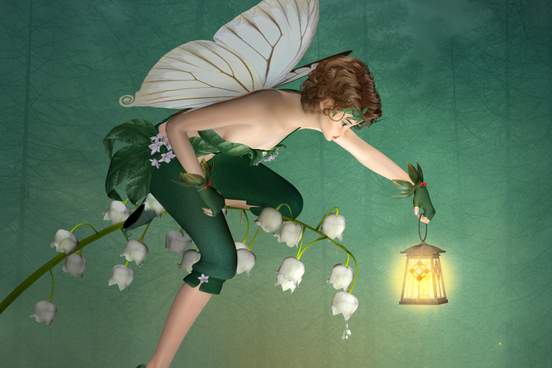
Nirvana
noun : the final state of utmost bliss that transcends suffering, karma, and samsara and is sought especially in Buddhism through the extinction of desire and individual consciousness
As singer Kurt Cobain once explained to journalist and author Michael Azerrad in the latter’s 1993 biography Come As You Are: The Story of Nirvana, “I wanted a name that was kind of beautiful or nice and pretty instead of a mean, raunchy punk rock name … I wanted to have something different.” Prior to landing on Nirvana, the band cycled through, however briefly, other monikers such as Skid Row, Bliss, and uh, Throat Oyster. The first-known use of nirvana in English appeared in the early 1800s, coming from the Sanskrit nirvāṇa, meaning literally “act of extinguishing,” itself from nis- (“out”) and vāti (“it blows”). (Interestingly, the English word wind is distantly related to vāti and therefore nirvana as well.) From its religious origins, nirvana has developed the broader meanings of “bliss” and “heaven” as in “The resort is a skier’s and snowboarder’s nirvana.”
The Scottish variety is challenging enough, but Uilleann pipes are in a class by themselves. They are difficult to obtain, harder to maintain and nearly impossible to play. Indeed, Uilleann piping is so intimately linked with frustration and suffering that players consider themselves initiates in what approaches a religion. According to tradition, it takes “seven years’ listening, seven years’ practicing and seven years’ playing to make a piper,” but the reward is mastery of a difficult physical skill, plus the experience of creating one’s own musical nirvana. The sound is something like an oboe, something like a bassoon, and, when all the various parts are used, like several of each playing at once. Even after 21 years, though, the suffering is not over.
— Michael D. Lemonick, Time, 16 Mar. 1987By the time Nirvana recorded their performance for MTV Unplugged in November 1993, they were the biggest band in the world. Not that they looked like it. Dave Grohl in his turtleneck and ponytail, Krist Novoselic wrangling his giant, borrowed bass, Kurt Cobain struggling to act relaxed in a room filled with people who thought he was a prophet.
— Mike Powell, Pitchfork, 24 Feb. 2019

The Bangles
noun : a stiff usually ornamental bracelet or anklet slipped or clasped on
Before they were the Bangles (of “Eternal Flame,” “Manic Monday,” and “Walk Like an Egyptian” fame), they were the Bangs, but upon discovery that there was already a band called The Bangs—with a copyright on the name, no less—extra letters were added. The change from Bangs to Bangles also meant that the band went from having a name of likely Scandinavian origin to one derived from the Hindi word baṅglī.
The stones in her bracelets ranged from saffron to palest yellow, but it was the bangle composed entirely of buttery golden stones with fiery orange hearts that captured Yoshi's gaze.
— Maya Kaathryn Bohnhoff, Analog Science Fiction & Fact, Volume 130 (2010)The Bangles’ garage-band philosophy puts them in the company of a number of other '60s-inspired L.A. groups … but on this delightful album they avoid the revivalist trap with their solid songwriting and some of the best harmonies since the Mamas and the Papas.
— Mikel Toombs, The San Diego Union-Tribune, 2 Sep. 1984

Wilco
interjection : —used especially in radio and signaling to indicate that a message received will be complied with
When it comes to naming your band, nouns are the lowest of low-hanging fruit. You’ve got your Temptations, your Strawberry Alarm Clock, your Heart, your whatever a Hoobastank is. Few and far between are the bands named with an interjection. But joining Judas Priest and perhaps A-Ha is the American band Wilco, whose nom de rock-and-roll is a conflation of “will comply.”
“Wilco,” Boyden said. “Wilco. Out.” He was speaking in Naval parlance acknowledging an order. His voice was like a hundred other voices that Briggs had heard on the radio speaker at sea, and there was the same finality and the same incisiveness in that word ‘out’ that meant those voices were gone, perhaps forever.
— John P. Marquand, Harper’s Magazine, Nov. 1945Wilco. Remember the name. Or don’t. It doesn’t matter. Either way, the rootsy group from Chicago, Minneapolis and Nashville is the best new band in America, as they proved with a Saturday night set at Liberty Lunch…
— Michael Corcoran, The Dallas Morning News, 20 Mar. 1995

Commodores
noun : a captain in the navy in command of a squadron
Commodore is probably a modification of the Dutch word commandeur, meaning “commander,” which itself came from French, and further back from the Old French comandeor, making it once, twice, three times “commander.” According to a People magazine article by Ken Kelley from 1978, the seminal Motown band—whose hits include “Brick House,” “Nightshift,” and “Easy” —formerly known as the Jays took the name “Commodores” when choreographer and multi-instrumentalist William King “flipped open a dictionary and ran his finger down the page. ‘We lucked out,’ he laughs. ‘We almost became The Commodes.’”
Even on the lakes, where alone we had squadrons, everything, from laying the keel of the vessels to firing the last gun before the enemy surrendered, was left to the young commodores in command.
— James Russell Soley, Scribner’s Magazine, February 1887The Commodores—all six of them college graduates—run a machine: a coolly efficient, meticulously planned business that controls everything from tours to merchandising and operates according to group mottos. Of course, this business also makes hit records, and good ones. After Motown signed them in 1972, the Commodores refused any advances, held out for two years against the company’s choice of material and producers, and finally released a terrific, funk album, Machine Gun.
Steve Pond, The Gazette (Montreal, Quebec), 25 Sep. 1980

Eurythmics
noun : the art of harmonious bodily movement especially through expressive timed movements in response to improvised music
Sweet dreams are made of eurythmics. Who are we, humble lexicographers that we are, to disagree? The adjective eurythmic debuted in English in the late 1800s, a synonym of harmonious. After the turn of the century (consider how aerobic led to aerobics, eurythmics arose as a noun referring to a method of musical training for young people developed by Swiss composer Émile Jaques-Dalcroze in the early 20th century that involves specific body movements in response to changing rhythms and pitches. For Jaques-Dalcroze, the rhythmic movements used in eurythmics were a means of musical education, not an end in themselves or a form of dance. Nonetheless, his system is considered an important influence on 20th-century theatrical dance, especially central European and American modern dance. Eurythmics was adopted as a musical name by a duo consisting of Annie Lennox and Dave Stewart around 1980, after the breakup of their former band the Tourists.
Also important in early Soviet theater was the Anthroposophical concept of eurythmy (not to be confused with Jacques Dalcroze’s eurythmics). Both systems stress rhythmic bodily movements, but eurythmics was a system of musical education, whereas eurythmy was said to express cosmic verities.
— Bernice Glazer Rosenthal, “Introduction,” The Occult in Russian and Soviet Culture (Cornell University Press, 1997)Further evidence of David Bowie’s apparently never-ending influence on contemporary rock styles was offered at the Ritz on Thursday, where the Eurythmics, the successful British techno-pop duo, made their New York debut. Consisting of the singer, songwriter and flutist Annie Lennox and the guitarist and singer David Stewart, the Eurythmics were augmented by a strong rhythm section, a keyboardist and elaborate pre-recorded sound effects.
—Stephen Holden, The New York Times, 17 July 1983

R.E.M.
noun : a rapid conjugate movement of the eyes associated especially with REM (rapid eye movement) sleep
Sweet dreams are also made of REM, short for rapid eye movement, movement of the eyes that occurs during a stage of sleep when the brain is particularly active, and when lucid dreaming often occurs. Like that of many bands, the name R.E.M. has been reported to have been chosen from the dictionary (you’re welcome!), but the band—which also considered the names “Twisted Kites” and uh, “Cans of Piss”—has denied this. In any event, the band inserted periods in their name, where most often REM is styled sans periods.
During REM sleep, neurons that permit the dream-inducing neurons to buzz with activity are themselves out of action. Normally, they are involved in attention and self-awareness. Hartmann suggests that this dormancy may explain why people remember better in their dreams than they do while awake: with the attention-paying neurons off, remote memories are unusually accessible. But once awake, some 95 percent of dreams vanish.
— Sharon Begley, Newsweek, 1989R. E. M., a Georgia band whose debut album, “Murmur” (A & M), reached the top 50 this summer, has given folk-rock a complete overhaul. R. E. M. laces its songs with folky electric guitar licks, yet turns folk-rock’s innocence upside down by pushing tempos, mumbling lyrics and breaking down folk-rock’s simple verses and choruses into a rush of melodies and images.
— Jon Pareles, The New York Times, 18 Sep. 1983

Soccer Mommy
noun : a typically suburban mother who accompanies her children to their soccer games and is considered as part of a significant voting bloc or demographic group
Soccer mom is a fairly recent coinage in English, about 50-years young at the time of this writing. The first-known use came from a letter to The Argus—then a newspaper in the town of Fremont, California—signed “Soccer Mom,” a descriptor self-applied by a proud parent. Soccer mom saw extended use decades later as representing a voting bloc in US elections, and became the stage name (as Soccer Mommy) of musician Sophie Allison in 2015.
Neville wanted something that “handled” better. I wasn’t interested in how she took the curves. I wanted a soccer-mommy van.
— Sherri Gardner Howell, The Knoxville News-Sentinel, 23 Apr. 2005Soccer Mommy (Sophie Allison), an indie-rock icon and an upcoming highlight of Hopscotch, has her musical signature over pop punk and shoegaze. With her latest album “Sometimes, Forever,” Allison explores the fusion of synthesizer and noise pop, writing on her self-discovering journey with an openness toward lie and pain.
— Katherine Zhong, The Chronicle (Duke University), 8 Sep. 2023

The Cardigans
noun : a usually collarless sweater or jacket that opens the full length of the center front
Cardigans? We love them, love them, say that we love them, both the warm, fuzzy sweaters and the Swedish band whose single “Lovefool” gave the world the warm fuzzies in 1996. The garment was named after James Thomas Brudenell, 7th earl of Cardigan, who with his inherited wealth personally outfitted his military regiment with what came to be called cardigan jackets.
A gray morning, the deck wet, the iron all beaded with frost, all the longshoremen in heavy pea-jackets or cardigans, the whole ship in a bustle, and the favored first-class passengers just leaving.
— Edward Everett Hale, The Brick Moon and Other Stories (Little, Brown, and Company 1899, orig. copyright 1869)When singer Nina Persson and keyboardist Lars-Olof Johansson of the Swedish band the Cardigans discuss their craft, passion fills the air. The group, which performs at sold-out shows tonight and Friday at the El Rey Theatre, takes its job seriously. “For me, being called kitsch is the worst thing we could be accused of,” says the soft-spoken Persson, addressing a misconception about the group’s goals that's so widespread it even appears in the record company’s official band biography. “We feel very sincere about what we do. We are burning with music,” Persson reaffirms.
— Elysa Gardner, The Los Angeles Times, 20 Feb. 1997

Pixies
noun : a fairy; specifically: a cheerful mischievous sprite
Pixies are small, humanlike creatures that make mischief; the origin of their name is officially unknown but may be related to the earlier English word puck, which refers to an evil or malicious sprite and which has been in English for over 1,000 years. The origins of the band name Pixies are more certain: as bassist Kim Deal (also of the legendary Breeders) told Spin Magazine in 2004, “Joey [Santiago, guitarist] found the band name in a dictionary. He didn’t come over here until he was seven, so some words he still had trouble with. It’s weird because he’s fluent in English. But every now and then a word creeps up, so he scans the dictionary.” A wonderful idea, if we say so ourselves!
She gathered the little madcap into her arms for one second, then taking the witch-like face in both hands kissed each flushed cheek as she said: “I sometimes think you claim kinship with the pixies, you are half a witch. So you accept the bargain? Good! Have all the fun you wish but don’t burn the house down.”
— Gabrielle E. Jackson, Peggy Stewart at School (The Goldsmith Publishing Company, 1918)Though the album title obliquely refers to the kindly Doctor D., the only animals the Pixies talk to are the shadowy ones that lurk inside us. Singer Black Francis, a fan of director David Lynch, writes unnerving lyrics worthy of “Eraserhead.” Listeners who merely want to dance can latch on to one of Kim Deal’s larger-than-life bass lines, or hitch a ride on a runaway train: Joey Santiago’s wild, churning guitar. With 15 thrill-a-minute songs, “Doolittle” is destined to be one of 1989’s best albums.
— Greg Kot, The Chicago Tribune, 11 May 1989

The Rolling Stones
noun : a person who changes his habitation, business, or pursuits with great frequency : one who leads a wandering or unsettled life
Variations of the proverb “a rolling stone gathers no moss” have existed in English for seemingly time immemorial, and the related use of rolling stone to refer to a vagabond dates at least as far back as the late 1500s, just slightly older than Mick, Keith, and company. Ah, we kid, we kid. The band did not take their name from the proverb, at least directly, however. As Keith Richards’ recounted in the 2003 book According to the Rolling Stones, the name was determined in a panic when the publication Jazz News responded the band’s request to make an ad and asked their name: “The Best Of Muddy Waters album was lying on the floor—and Track One was ‘Rollin’ Stone Blues’. So the band’s name was picked for us by Muddy Waters.”
“Oh my own pretty darling sweet Miss Floy!” cried the Nipper, running into Florence’s room, “to think that it should come to this and I should find you here my own dear dove with nobody to wait upon you and no home to call your own but never never will I go away again Miss Floy for though I may not gather moss I’m not a rolling stone nor is my heart a stone or else it wouldn’t bust as it is busting now oh dear oh dear!”
— Charles Dickens, Dombey and Son (Bradbury & Evans, 1848)The Rolling Stones’ relation to pop right now is like Shakespeare’s to cyberpunk fiction: the influence is there because it’s everywhere, but in specific terms, it is centuries removed. The Stones know this. That’s why their new album, “Bridges to Babylon” (Virgin), updates their classic blues-rock style rather than jumping on new trends.
—Ann Powers, The New York Times, 18 Oct. 1997





